|
|
|
Sort Order |
|
|
|
Items / Page
|
|
|
|
|
|
|
| Srl | Item |
| 1 |
ID:
084399


|
|
|
|
|
| Publication |
2008.
|
| Summary/Abstract |
Democracy as political doctrine has its fair share of controversies over the adjudication of rights and the prioritization of the individual over the community. These debates have largely derived from its western genesis. The current stage of global development has however supplied many non-western perspectives on democracy which suggest that any consensus over an identifiable body of democratic thought is likely to witness more sub-diversity than ever before. This article argues that contemporary Asian thinkers on the philosophy of government have a valuable contribution to make to democratic discourse notwithstanding the clichés of the Asian Values debate of the 1990s. By performing a sampled reading of José Rizal, Sukarno and Lee Kuan Yew on their diverse interpretations of guided democracy in a nationalistic context, it will be shown that these three modern Southeast Asian political thinkers would offer some tentative Asian insights on the democracy of dignity and of responsibility.
|
|
|
|
|
|
|
|
|
|
|
|
|
|
|
|
| 2 |
ID:
155153
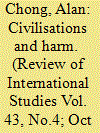

|
|
|
|
|
| Summary/Abstract |
Andrew Linklater’s Violence and Civilization in the Western States-System is to be both praised and critiqued for opening spaces for discussing civilisational standards in the era of a globalising world. It offers a healthy provocation for inquiry into how non-Western states ought to comprehend the legacies of Western political evolution colouring existing ‘IR’ as a discipline. Linklater’s book inspires three thematic reactions: globalisation does bring harm; the notion of a universal civilisation remains open to debate; and the possibilities of civilising patterns in premodern Southeast Asia serving as supplementary mirrors and extensions of the relationship between violence and civilisation. It is suggested that Linklater’s sequel must consider the trajectory of non-Western sociologies of IR.
|
|
|
|
|
|
|
|
|
|
|
|
|
|
|
|
| 3 |
ID:
172800


|
|
|
|
|
| Summary/Abstract |
While local Marxist and neo-Marxist parties attempted to synchronize their revolutionary struggles with the centers of world communism during the period 1945–1991, political currents on the ground in Malaysia and Singapore were pushing for the establishment of postcolonial authority, social peace, and economic prosperity. The Cold War struggle between 'communism' and 'democratic capitalism' was highly refracted, even distorted, on the ground in these two Southeast Asian countries. This refraction was largely manifested in the struggles by nationalists of all ideological stripes to achieve a multiracial society through interethnic decolonization under the banner of waging 'class warfare' against colonial authority. For many anti-colonial political parties, siding with or joining leftist movements was a façade for revolutionary agendas that were not necessarily Marxist-Leninist in orientation. Secondly, the biographies and civil society narratives of contending political figures of the time suggest that they were less inclined to define their thinking about development along Cold War ideological orthodoxy than to defy the latter to make things work for prosperity. Finally, the successor elites who took the place of the colonial rulers were consistently obsessed with burnishing sovereignty in spite of the international Cold War. This can be seen in their slippery practice of nonalignment in foreign policy. The Malaysian and Singaporean cases strongly present the thesis of indigenization of the Cold War for local purposes.
|
|
|
|
|
|
|
|
|
|
|
|
|
|
|
|
| 4 |
ID:
144532
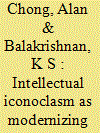

|
|
|
|
|
| Summary/Abstract |
This article attempts to engage in a preliminary twinned study of the foreign policy styles of Mahathir bin Mohamad and Lee Kuan Yew within the framework of ‘modernizing Southeast Asian foreign policies’. Modernization is a process of immense multidimensional displacement in economy, society, political system, attitudes towards politicians, identities, work, and consumption. As such the onus falls upon their leaders to either mitigate change or productively awaken their followers to embrace a new mode of thought. Both Lee and Mahathir have however chosen to engage in the foreign policy of intellectual iconoclasm featuring the narrative of ‘productive shock’, manufactured nationalist logics, elitist policy-making and elaborate self-propaganda.
|
|
|
|
|
|
|
|
|
|
|
|
|
|
|
|
| 5 |
ID:
164357


|
|
|
|
|
| Summary/Abstract |
Through a qualitative analysis of three air disasters from Asia in recent years—MH370, MH17 and QZ8501—this article investigates the puzzle of how aviation disasters open up a sovereign state’s domestic governance and foreign policy to international questioning within an anarchic international system. This enquiry thereby highlights the gaps in the global governance of aviation, particularly in the areas of safety and recovery in the wake of aviation disasters. Three linked literatures demonstrate this dynamic. First, aligned with the ‘emotional turn’ in international relations, we show that the portrayal of air disasters and grieving next of kin in global media highlights the politics of grief and trauma. Second, aviation disasters surface the politics of disaster diplomacy in the guise of ‘security competition by proxy’ in the recovery process. Third, we emphasize that these shortfalls in domestic governance and international cooperation demonstrated by the attention-grabbing spectacle of aviation disasters consequently underscore important knowledge, norms and compliance gaps in global aviation governance. Aviation disasters and their aftermath thus shine an international spotlight on the state’s domestic governance and foreign policies in these three manners.
|
|
|
|
|
|
|
|
|
|
|
|
|
|
|
|
| 6 |
ID:
152095


|
|
|
|
|
| Summary/Abstract |
The Singaporean polity has created the ‘militarized civilian’. This policy phenomenon beckons the question: How is this cross-fertilization carried out in Singapore's civil–military relations? Militarization is in the first sense meant to inculcate a calibrated dual personality within the civilian whereby being an effective soldier requires indulging in simulated military suffering as a badge of pride; at the same time, the citizen soldier has to believe that military and civilian values are perfectly interchangeable and contribute equally to the maintenance of peace. In a second sense, militarization is equally about permanently ritualizing sacrifices for a communitarian defence. We argue that while mostly successful, militarization also produces the tension arising from the need to appear pugnaciously vigilant while avoiding the casualties that must logically arise from heightened simulated combat. This tension is explained through two dimensions of ongoing crises: the parameters of a politically dramatized National Service ritual; and the constant propaganda of geopolitical dangers threatening the Republic.
|
|
|
|
|
|
|
|
|
|
|
|
|
|
|
|
| 7 |
ID:
113781


|
|
|
|
|
| Publication |
2012.
|
| Summary/Abstract |
Contemporary research on the international relations of Southeast Asia has neglected the latent possibilities of reading non-western indigenous forms of international relations as a contribution to worldwide debates on the nature of international politics. Drawing on one precolonial account of Southeast Asian political practices in the Malay Archipelago, the Sejarah Melayu, this article proposes that Southeast Asians have previously philosophized about "intersocietal relations" in ways that privilege noble prowess, knowledge quests, and hierarchical justice through the interdependence of trade and culture within the region, and with India, China, and the Arab world. These features can still speak to contemporary relations between peoples rather than states and to security issues within borderless regions.
|
|
|
|
|
|
|
|
|
|
|
|
|
|
|
|
| 8 |
ID:
143658


|
|
|
|
|
| Summary/Abstract |
When Malaysia Airlines Flight MH370 disappeared from radar screens in the early hours of 8 March 2014, initial reactions suggesting that it was just another airliner disaster proved only partially correct. This article offers the interpretation that the multinational search effort for the missing Malaysian Boeing 777-200 airliner was revelatory of an abridged form of security competition among the mostly Pacific Rim states participating in both the post mortem and the search and rescue (SAR) operations. Although the Asia Pacific peace has been largely unbroken since the end of the Cold War, security competition among great powers, middle powers and weak states is still ongoing. In fact, this security competition is taking on proxy forms given the relative robustness of the overlapping architecture of Pacific Rim security regionalism in tamping down pressures for overt armed conflict to advance national security interests. MH370, following in the wake of the destruction wrought by natural disasters since the early 2000s, has provoked a competition in technological prowess in SAR operations, and more broadly, in quasi-civilian humanitarian assistance and disaster relief (HADR) capabilities amongst Pacific Rim states that have overlapping claims on the South China Sea and with interests in revising existing patterns of diplomatic order.
|
|
|
|
|
|
|
|
|
|
|
|
|
|
|
|
| 9 |
ID:
051399
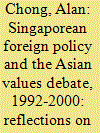

|
|
|
| 10 |
ID:
072995


|
|
|
|
|
| Publication |
2006.
|
| Summary/Abstract |
This article aims to uncover the nuances of Singaporean foreign policy's theoretical contributions to a local variant of realism in international relations, as sourced from the thoughts and discourse of the Republic's elite foreign policy-makers. Previously, pinioning Singapore within classical realism has meant that questions of hegemonic socialization of ideas have been ignored in analysing its foreign policy. It behoves the scholar to pose questions to ideological verities of policy doctrines: From where did it originate? What are its tenets? How is it chosen over other alternatives? The conclusion however hopes to reveal that in terms of discourse ‘Singaporean realism’ is less completely faithful to classical realist precepts than is originally believed by pre-existing scholarship. The theorizing of Singaporean foreign policy is likely to be reconciled in terms of an oxymoron such as ‘practical idealism’ and ‘weak state, soft power’.
|
|
|
|
|
|
|
|
|
|
|
|
|
|
|
|
| 11 |
ID:
178403


|
|
|
|
|
| Summary/Abstract |
The study of small state perceptions of international order has been much neglected. Small state leaders are intellectual heavyweights in a disproportionate relationship to their respective sovereign territorial domains. To navigate the treacherous currents of international order, they rely on their own synthesised views of manoeuvrable spaces amongst great powers. Simultaneously, they are also reflective of the limits of global institutional governance. Moreover, small state leaders frequently weigh international order in moral terms. The intellectual propaganda of charismatic and authoritative foreign policy leaders from then-Czechoslovakia, Ghana and Singapore will be read to illustrate these insights. The conclusion will suggest that small state theorising can enrich mainstream IR theory as a result of these perspectives from small state actorness.
|
|
|
|
|
|
|
|
|
|
|
|
|
|
|
|
| 12 |
ID:
098880
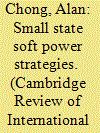

|
|
|
|
|
| Publication |
2010.
|
| Summary/Abstract |
The concept of soft power, or symbolic power, offers unexplored potential for analysing small state power. This article argues that it is a means of virtual enlargement of small states' foreign policy reach and presence. If one examines the bases of soft power, it becomes evident that small states can utilize their political economy potential, models of good governance and diplomatic mediation as forms of power that defy their territorial limitations. Case studies of the Vatican City State and Singapore illustrate 'small state soft power'.
|
|
|
|
|
|
|
|
|
|
|
|
|
|
|
|
| 13 |
ID:
137254
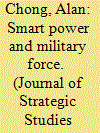

|
|
|
|
|
| Summary/Abstract |
Smart power is comprised of two elements: the quest for building society among states and between states and non-state actors; as well as the desire for cleaner forms of power projection. This special issue explores how states continue to fumble over achieving the optimum mix of hard and soft power across several country cases and themed articles. This set of contributions suggests that smart power is not unlike a ‘Swiss Army Knife’ analogy: multifunctional and challenging to choose the right combination of ideational and material tools.
|
|
|
|
|
|
|
|
|
|
|
|
|
|
|
|
| 14 |
ID:
085876


|
|
|
|
|
| Publication |
2009.
|
| Summary/Abstract |
This preliminary survey of international relations (IR) teaching in Singapore argues that while the hegemonic goals of the nation-state have been pervasive since 1956, the influences upon IR teaching have become more complex and subtle in tandem with Singapore's transition from pristine developmentalism to an aspiring global city. Today, IR teaching has acquired characteristics of a division of labor among the main universities, research institutes, and business-oriented schools. Nonetheless, the dialectics of whether the future lies in open-ended knowledge inquiry or hewing to some version of state-associated pragmatism remains unresolved.
|
|
|
|
|
|
|
|
|
|
|
|
|
|
|
|
| 15 |
ID:
085875


|
|
|
|
|
| Publication |
2009.
|
| Summary/Abstract |
The teaching of international relations (IR) at universities in Southeast Asia plays a role in the production of knowledge about the IR of Southeast Asia. As a complement to the scrutiny of published research output, a focus on teaching offers one pathway toward comprehending the constitution of meaning in both the IR of Southeast Asia and the broader IR discipline. This introduction to a collection of essays on the teaching of IR in Southeast Asia also discusses the potential ways by which attention to teaching may uncover the socializing role of pedagogy. An inquiry into the discipline as it is taught in the region throws light on how particular national legitimating myths are reproduced, the transmission of collective historical memories, the dominance of certain schools of international thought, and the role of civil society in Southeast Asian knowledge production.
The study of Southeast Asian international relations (IR) has undergone a number of changes since its emergence as a field during the Cold War. Theoretical preoccupations have shifted over time, as have the empirical questions that have attracted most attention. Questions of identity formation, ideational sources of political power, and prospects for regional community building have come to dominate a large part of scholarly output, marking an evolution from earlier 'problem solving' research that examined the national security of individual states and balance of power considerations. In the policy world, the diplomatic turn toward introspection regarding the future of Southeast Asian regionalism, writ large in the ASEAN Charter project, serves as another inspiration to look back in curiosity at the ideational paths that have led Southeast Asian power elites to contemplate a hint of European Union-style international institutionalism.
The existing IR literature about Southeast Asia has begun to address the question of how and why policy discourses and preoccupations have changed. Two leading journals in the field, The Pacific Review and International Relations of the Asia-Pacific, have, since the late 1990s, published between them two special issues and several articles assessing the archaeology of IR research about the region. To date, the self-conscious scrutiny of IR as a discipline has involved academics in the English-speaking 'West' more than those located in Asia. This situation is increasingly at odds with developments in the region. Two decades ago, Stanley Hoffmann diagnosed IR as a particularly American social science (Hoffmann, 1977). Yet, as shown in this collection of essays, the IR discipline in Southeast Asia has seen rapid growth in institutional terms over the last decade: new departments and centres focusing on IR have been opened in a number of Southeast Asian countries, and courses on IR have proliferated. The number of students graduating with major or minor concentrations in IR, as well as in related areas of study, such as strategic and security studies, has grown markedly at both undergraduate and graduate levels. In addition, a growing amount of the scholarship on the IR of Southeast Asia is now being produced by individuals located in Southeast Asia. Despite this development of the discipline in the region, many core questions surrounding the processes of knowledge production in the area of Southeast Asian IR remain unaddressed. Scholars located in the region are now more productive, in terms of their internationally recognized publications, yet how much of this scholarship continues to be produced in the shadow of the West remains an open question. In contrast to the reflective enquiry into the conditions under which 'area studies' knowledge and scholarship on Southeast Asia has been produced (e.g. Sears, 2007), the IR field in Southeast Asia has produced no comparable set of studies.
Given that academic disciplines reproduce dominant ideas through the teaching process - one could even argue that the teaching imperative is hard
|
|
|
|
|
|
|
|
|
|
|
|
|
|
|
|
| 16 |
ID:
127808
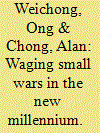

|
|
|
|
|
| Publication |
2014.
|
| Summary/Abstract |
Small wars" have returned to the international political agenda in the early twentieth century with almost a vengeance. Leaving aside the factors of social media and satellite television today, the nature of small wars has adhered to its politicized, xenophobic, and asymmetrical characteristics. The latter were predicted by British and American military manuals produced in the early to middle twentieth century. This special issue aims to revisit the nature of small wars in the era of great power interventions in Iraq, Afghanistan, and Libya in the 2000s. It will be apparent that two further characteristics need to be appended to small wars: chameleonic missions and virtual aggression.
|
|
|
|
|
|
|
|
|
|
|
|
|
|
|
|
|
|
|
|
|